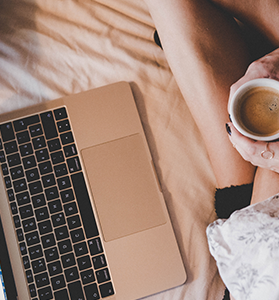Self-care tips for working from home
Whether you work from home on a regular basis or you’re temporarily unable to get into the office, self-care is important for home working. Little things that seem unimportant can make a big difference to how well you work, your stress levels and your work/life balance. Here are our top six tips for better home working.
De-clutter
A clutter-free workspace is more important than you might think. A study by Princeton University found that clutter – i.e. objects that are irrelevant to the task you’re doing – overwhelm the visual cortex and reduce your focus. Not only could this slow you down but it could also increase your stress levels.
Look after your back
A 2016 survey by TalkTalk found that 21% of home workers work from their bed. But according to the British Chiropractic Association, looking down at a laptop screen while sitting in bed can damage the posture and cause back pain. The top of your screen should ideally be at eye level, so that your head is not tilted downwards for long periods. If you work from home permanently, getting a proper chair is an important investment for your long-term health. If that’s not possible, make sure your back is supported by a cushion and avoid chairs that put you in a slouching or hunched position.
Walk away from your workspace
When you’re working in an office, you can physically walk away from your work at the end of the day – not so for home workers. If you can, try and work from a different room to the one you’ll be relaxing in at the end of the day. If your living situation doesn’t allow for this, at least have a desk that you can pack up and move away from in the evening. This will help you shift your mind from ‘work mode’ after hours.
Regulate your hours
Mobile technology has blurred the boundaries between work and home life for all of us. But setting boundaries can be even more difficult for home workers. Having a regular start time, break time and finish time – if possible – will make it clear to your colleagues when you’re available. It’ll also help you resist distractions when you’re working and give you a clear end to your working day.
Use proper lighting
Lighting – or a lack of it – can affect your eyes, your concentration and your mental health. Try and get some natural light in your workspace, as daylight can improve your mood. Make sure the room is bright enough to enable you to read without straining, and position your screen away from glare or reflections.
Keep in touch
Despite the many advantages of working from home, it can get a little lonely at times. Daily check-ins with your colleagues – even if there’s nothing specific to report – will help maintain team spirit. Instant messaging applications like Skype and Google Hangouts are great for keeping in touch. They’re available on desktop or mobile devices, less clunky than email and also have video/voice call functions. Slack is great for online collaborations and virtual group chats.
My Possible Self is a self-help mental health app that can help you beat stress, anxiety and depression, and help you live better. Get the app here.







